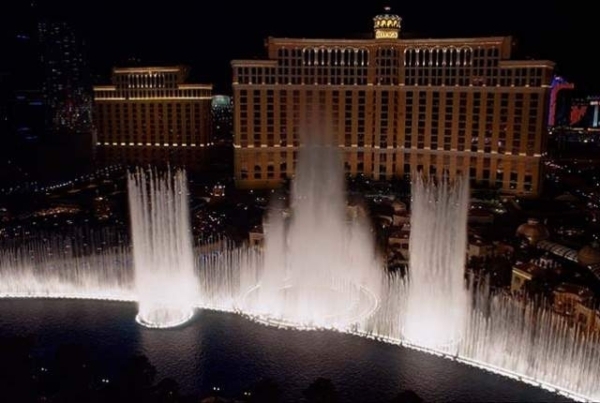MGM Growth Properties won’t send the casino industry into REIT frenzy

Don’t look for the floodgates to open now that MGM Resorts International has unveiled its plans for a real estate investment trust.
Two years ago, Penn National Gaming spun off Gaming and Leisure Partners as the first — and only — casino industry REIT. Since then, Pinnacle Entertainment struck a deal to sell its casino holdings to GLPI, and Caesars Entertainment Corp. asked the federal bankruptcy court to convert its largest operating division into a REIT.
Boyd Gaming Corp. said last year it was exploring the benefits of a REIT transaction but has been mum on the process since.
Nomura Securities gaming analyst Harry Curtis told CNBC that once MGM has completed its REIT, additional casino industry REIT discussions should end.
Las Vegas Sands Corp. and Wynn Resorts Ltd. — MGM’s competition on the Strip and in Macau — collect some 65 percent of their quarterly revenue from their International properties. Curtis said regional gaming operators, other than Boyd, Penn and Pinnacle “are just too small” for a REIT.
Curtis said investors were “making a mistake” if they believe other casino companies are headed down the REIT path.
MGM, is a “different animal,” Curtis said after MGM announced it would move 10 resorts into MGM Growth Properties, a publicly traded REIT.
For now, Wall Street is still trying to understand MGM’s REIT fundamentals.
In July, MGM Resorts Chairman and CEO Jim Murren said the company was “very engaged” in REIT talks going back to 2007. When MGM announced a “profit growth initiative” to increase annual cash flow some $300 million by 2017, a REIT concept was expected as part of the equation.
MGM unveiled the plan Oct. 29. Seven Strip properties (Mandalay Bay, The Mirage, Monte Carlo, New York-New York, Luxor, Excalibur, and The Park) and three regional resorts (MGM Grand Detroit, Beau Rivage and Gold Strike Tunica) would move into MGM Growth by the end of March. The REIT will also assume $4 billion of MGM’s $12.8 billion in debt.
Wall Street still needs more information to research the deal.
Deutsche Bank high-yield gaming bond analyst Andrew Zarnett said the lack of “preliminary math” provided by MGM, “left us with more questions than answers.”
Fellow Deutsche Bank gaming analyst Carlo Santarelli said he was “reserving judgment on the prudence of the REIT given the many unknown moving parts.” Still, Santarelli believes the REIT will be “accretive to equity value, but how accretive is something we struggle with.”
Union Gaming Group analyst Christopher Jones said investors questioned how to value the transaction.
The Street’s Jim Cramer, however, called the REIT “a brilliant move” and credited Murren with having “figured out how to make things work while Macau slips.”
MGM’s Strip and regional casinos are responsible for more than 70 percent of the company’s quarterly revenue. The three Strip resorts not part of the REIT — Bellagio, MGM Grand and Circus Circus — accounted for 46 percent of MGM’s quarterly operating income. The company’s joint ventures, including CityCenter and its Macau holdings, were held out of the REIT.
REITs don’t pay federal income taxes but are required to distribute at least 90 percent of their taxable earnings to shareholders.
MGM Growth Properties has a much different structure than GLPI, which was formed with 21 of Penn’s 29 casinos and racetracks. GLPI also took a chunk of Penn’s corporate management, including chairman Peter Carlino and chief financial officer Bill Clifford. The REIT spinoff took nearly a year to complete. Penn operates the properties under a lease agreement, and the two public companies are separate.
This won’t be the case with MGM Growth Properties. MGM Resorts said the REIT is not a “spinoff” and doesn’t require Internal Revenue Service approval. MGM will own at least 70 percent of the REIT after the initial public offering and will pay a yet-to-be-determined rent figure. Murren is expected to chair both company boards, and the REIT will have a separate CEO and management team.
In the announcement, MGM Resorts said the REIT has the right to acquire the company’s two development projects in Massachusetts and Maryland.
Matt Davidson, managing director of Conway MacKenzie in Detroit, a financial advisement firm, said the REIT’s success depends on its ability to grow beyond MGM Resorts. GLPI is paying $4.75 billion for land and buildings associated with Pinnacle’s 14 casinos and bought an Illinois riverboat casino last year.
“If they are unable to do things outside of MGM, then the company is basically just swapping debt,” said Davidson, who has advised Greektown Casino in Detroit and offered valuation opinions on Las Vegas resorts.
“Even though we haven’t gotten a great amount of detail, I think they’ve done a brilliant job of potentially unlocking value in the real estate and they have a tremendous amount of flexibility,” Davidson said.
— Howard Stutz’s Inside Gaming column appears Wednesdays and Sundays. He can be reached at hstutz@reviewjournal.com or 702-477-3871. Find on Twitter: @howardstutz.